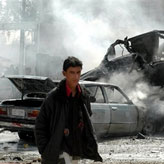Suicide bomber kills 30, 3 soldiers die
(AP)Updated: 2007-03-08 08:36
In Karbala, 50 miles south of Baghdad, Iraqi security forces set up a six-ring cordon around the two main Shiite shrines as the city swelled with hundreds of thousands of pilgrims.
"All the city's entrances have been secured, and I call upon the pilgrims to follow the instructions of the security forces and let them do the necessary searches," Iraq's minister of state for national security, Sherwan al-Waili, said in Karbala.
"Terrorists are adapting and improvising new ways of hurting people. Preparations have been made in hospitals to receive emergency cases," he said.
But the attacks have done little to discourage religious fervor among the Shiites, free to practice their rituals since the collapse of Saddam Hussein's Sunni-led regime in 2003.
Abbas Ghatie Ali, a 32-year-old pilgrim walking from Baghdad to Karbala, tied a list of emergency contacts around his neck in case he was hurt along the way.
"I'm wearing this card to identify me if I'm killed during the journey to Karbala," Ali said. He said he would defy threats by Sunni extremists because Shiites are "the majority and will defend our ideology and doctrine."
Another pilgrim, Khadija Tawfek Mouhsin, said his brother was killed last year on a march to Karbala but he was determined to make the trip himself. "The terrorists give us the chance to go to paradise," he said.
During the past two years, the Mahdi Army militia of radical Shiite cleric Muqtada al-Sadr watched over pilgrimages to Karbala. This year, the militia bowed to government pressure and put aside their arms to avoid any confrontation with US-led forces during the Baghdad security crackdown.
With the militia on the sidelines, Shiite leaders have expressed anger that the Shiite-led government security force had failed to protect the marchers.
Attacks against pilgrims have also sharpened sectarian tensions at a time when US officials had hoped the Baghdad security operation would encourage Shiite, Sunni and Shiite leaders to come together in power-sharing agreements to end the crisis.
Instead, new strains have emerged, not only between the rival Islamic sects but within the dominate Shiite political bloc itself.
On Wednesday, the Fadhila party, which holds 15 seats in parliament, announced it was withdrawing from the Shiite alliance and serve as an independent bloc.
The reason for Fadhila's decision was unclear, but the party, which controls the provincial administration in Basra, appeared to be positioning itself to align with other sectarian factions at a time of growing disappointment over Prime Minister Nouri al-Maliki's government.
 | 1 | 2 |
|
||
|
||
|
|

